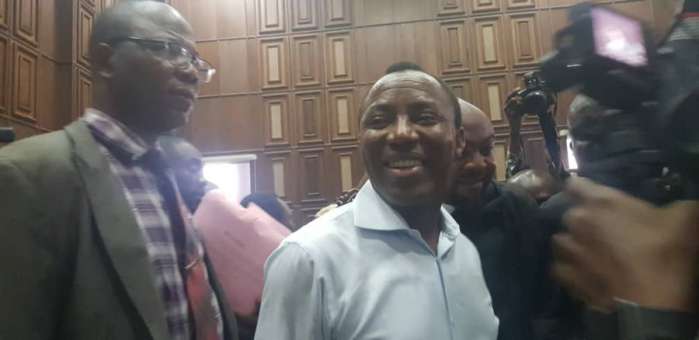The Federal Government, on Friday, gave reasons why it opposed a request by detained activist and convener of the #RevolutionNow protest, Mr Omoyele Sowore, to be released on bail pending the determination of the allegation that he committed a treasonable felony.
In a 27-paragraphed counter-affidavit it filed before the Abuja Division of the Federal High Court, the government, maintained that Sowore who has been in detention since August 2 when he was arrested by operatives of the Department of State Service, DSS, posed “a threat to national security”.
FG, through its team of lawyers led by Mr Hassan Liman, SAN, expressed fears that the defendant would call for another revolution once he is freed from custody, saying there was “likelihood of the defendant committing the same offence again”.
Besides, the prosecution urged the court to consider the severity of the allegation against the detained activist who was the presidential candidate of the African Action Congress, AAC, in the last general election, contending that the defendant posed flight risk having realised that the charge contained a capital offence that would attract a life imprisonment upon his conviction.
It told the court that Sowore was based in the United States of America, USA, and would jump bail if released from detention.
More so, FG urged the court to take judicial notice of the case of the leader of the proscribed Indigenous People of Biafra, IPOB, Nnamdi Kanu, who it said escaped from the country after he was granted bail on a similar charge.
Relying on a Supreme Court decision in Asari Dokubo Vs FRN, which it said also involved treasonable felony charge, the prosecution argued that Sowore deserved to be denied bail, saying he had on the day he was arraigned, kept chanting and calling for a revolution while he was being led out of the court.
“This is a clear indication that once released on bail, he will go out there and engage in acts that will amount to a threat to national security”, Liman added.
Consequently, FG urged the court to deny Sowore and his co-defendant, Olawale Adebayo Bakare (aka Mandate) bail, and order their accelerated trial.
“Investigation has been concluded and we are willing and ready for accelerated hearing, if possible, on a day-to-day basis so that the 1st defendant can return to the USA”, the prosecution added.
However, Sowore, through his lead counsel, Mr. Femi Falana, SAN, argued that FG failed to give any cogent reason why he should not be released on bail pending his trial.
He argued that since he is presumed innocent by virtue of section 36 of the 1999 Constitution, the onus was on FG to establish why he should remain in detention.
Falana argued that despite the allegation that Sowore planned to overthrow the government of Nigeria by staging a protest tagged #RevolutionNow, FG failed to adduce any evidence to substantiate the charge
He told the court that current leaders of the ruling All Progressives Congress, APC, including President Muhammadu Buhari, had in 2011, called for the kind of revolution that took place in Egypt, which he said was violent.
He noted that in the instant case, Sowore had specifically warned his followers not to engage in any form of violence but to protest peacefully.
“We submit that the use of the word Revolution is not a criminal offence in Nigeria and it has never been criminalized. Hence, President Buhari called for a revolution and was never arrested or prosecuted”.
He noted that the only time some youths were arrested for using the term “Revolution” was in 1948 under the colonial era, noting however that they were not charged with treason but with sedition.
On count-two of the charge that bordered on the allegation that Sowore insulted President Buhari, Falana argued that under the law, no public office is allowed to use the machinery of the state to settle scores with his opponent.
“If the President feels offended by any statement made by the 1st defendant, the only option open to him into sue for libel.
“In Nigeria today the right to protest has been guaranteed and recognised by the Constitution”. Falana told the court that Buhari had in 2003 after he lost election under the defunct ANPP and decided to stage protest all over the country and was disbanded by police, briefed him to go to court to challenge the action.
He said the Court of Appeal, in its judgement in 2008, upheld the right of Nigerians to protest against the government without firstly security Police permit. He further argued that the allegation of money laundering was not enough to deny the defendants bail, “when those that stole billions have all been granted bail”.
He argued that whereas Dokubo admitted in his own statement that he was involved in the blowing up of pipelines in the Niger Delta, Sowore never admitted that he committed any offence in his own statement. Falana, therefore, urged the court to grant Sowore bail on self recognizance describing him as “a political leader”.
More so, he drew the attention of the court that Sowore was earlier granted bail on the condition that he would deposit his international passport with the Registrar. Meanwhile, after she had listened to both sides, trial Justice Ijeoma Ojukwu stood down to rule on the bail applications.
Sowore who is the publisher of an online media platform, Sahara Reporters, was arrested after he called for a nationwide protest against perceived maladministration by the President Buhari-led government.

